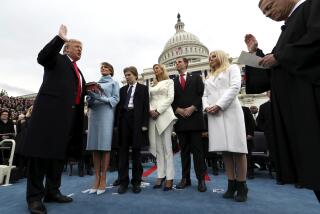Scripture on the Outfield Fence
- Share via
The dispute is headed for a legal showdown over the 1st Amendment, the separation of church and state and baseball.
And if businessman Ed DiLoreto carries the day, he will be able to post the Ten Commandments in an advertisement along the outfield fence of the Downey High School baseball field.
DiLoreto, who runs a Downey engineering firm, insists that he is simply exercising his 1st Amendment rights and promoting good morals among youngsters. He reserved a spot on the fence for $400 in 1995, but rather than hawk the machine parts he sells, he decided to post the biblical text.
“I’m not trying to sell religion,” DiLoreto said. “I’m trying to sell rules to live by.”
Downey school district officials resisted the idea, and the two sides are locked in litigation in state and federal court. If DiLoreto prevails after returning to state court Sept. 3, the baseball field could become the latest spot to display the Ten Commandments in a widening national debate about the boundaries of religious expression. The text has shown up in courtrooms, county government chambers and other such public spots in Alabama and South Carolina.
Opponents concede that the Ten Commandments may not be offensive to many people. But they warn that by allowing the text to be posted in public, the school district could compromise the constitutional wall separating church and state, clearing the way for more problematic religious messages at the baseball field.
“We are in existence to educate, not to get involved in religious demands,” said Gary Gibeaut, an attorney for the school district. “I can think of a lot of different entities that would like to come in and push their messages on kids. We felt the interests of the district were not being served.”
*
But the law leans toward DiLoreto, several legal experts said. Because school officials opened the ball field to outside businesses without restricting what sort of advertisements could be posted, the district will probably face an uphill battle in court, said Steven Green, legal director of the Washington-based Americans United for Separation of Church and State.
“Ten to one they can’t keep the church, or whoever, from posting this,” Green said. DiLoreto’s sign “raises some real problems,” he said. What if someone wanted to buy an ad and say something disparaging about the Catholic Church, Green asked. “Where do you draw the line?”
Courts across the country have tried to draw such a line over public religious expression in several recent cases, but a definitive answer has proved at least as elusive as a fly ball lost in the sun.
In Alabama, a judge was ordered to remove a plaque of the Commandments from his courtroom, but he refused to do so. And Alabama’s governor threatened to call the National Guard to stop anyone else from removing it.
An Ohio baseball fan who displayed a “John 3:16” sign at Cincinnati’s publicly owned stadium tried to settle an argument over his message by changing it to “Go Reds. John 3:16,” and eventually won in court.
A South Carolina judge ruled earlier this month that the Charleston County Council ran afoul of the Constitution by hanging the Ten Commandments in its chambers, saying: “Government may not affiliate itself with religious symbols or doctrines in a manner that suggests an endorsement of a particular religious faith.”
Downey school officials have based their defense on that argument. Lawyers for the school district also noted, however, that since DiLoreto launched his effort, the district has taken down all advertisements on baseball fields at all its high schools. That action, they said, could render the issue moot.
DiLoreto’s attorney, Patrick Manshardt, contends that removing all the signs simply to block one--his client’s--is unfair.
“If their intention is discriminatory, they’re clearly outside the law,” he said.
Several prominent political and business leaders agree. DiLoreto’s newly formed advocacy organization, Congress for American Principles, has as members county Supervisor Mike Antonovich, Carl’s Jr. restaurant chain owner Carl Karcher and Knott’s Berry Farm owner Stephen Knott.
Despite the heavy hitters on DiLoreto’s roster, the effort to place the sign in the field may be misguided, according to Green, the Americans United lawyer.
“The thought that just putting up some kind of sign is going to have some beneficial effect is naive,” Green said. “It becomes lost in everything else. It becomes no different from general advertising.”
DiLoreto’s attorney said that is the point.
“There’s no difference between a sign that says Drink Coca-Cola, and Mr. DiLoreto’s sign,” Manshardt said. “It’s not within their power to tell Mr. DiLoreto what he can or can’t put on his sign. The price of the 1st Amendment is having to support the rights of people saying what you disagree with most.”
More to Read
Sign up for Essential California
The most important California stories and recommendations in your inbox every morning.
You may occasionally receive promotional content from the Los Angeles Times.









